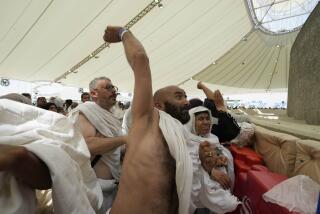Muslims Share Great Feast With Poor After Ritual Slaughter of Sheep
- Share via
CAIRO — Abdel Hamid woke before dawn, lit his first cigarette of the day and moved his children’s bikes into the far corner of the stairwell so the blood would not spatter them.
Then, with another cigarette dangling from his lips, he sharpened his knives, kneeled over the struggling animal below him and heeded the words of the Koran: “We have given you a river in heaven, so pray to your God and sacrifice.”
Before this morning was over, Abdel Hamid would chain-smoke a pack of cigarettes and slaughter, skin and quarter 16 sheep and one cow. The blood would soak through his trouser legs and splatter the front of his shirt before running from the stairwell to the drain in the center of the floor. Even the bicycle frames were specked with red.
Throughout the Muslim world, from the dank stairwells and dusty courtyards of Cairo apartment buildings to the windswept foothills of Saudi Arabia’s Mt. Arafat, the ritual was repeated as millions of faithful celebrated Eid al Adha, the great feast that marks the climax of the hajj, the annual pilgrimage to Mecca that every observant Muslim is expected to make at least once in a lifetime.
Abraham and Ishmael
The four-day holiday beginning Monday commenced with the ritual slaughter of sheep to commemorate Abraham’s obedience to God’s command to sacrifice his son Ishmael (Isaac in Judaism and Christianity). At the last moment, according to Muslim belief, Ishmael was spared when an angel appeared with a ram to be sacrificed in the child’s place.
No one is sure how many sheep are slaughtered for Eid al Adha every year. But the Koran says that every family that can afford to must sacrifice its own sheep. In Cairo, a metropolitan area of perhaps 14 million people, that adds up to a lot of mutton.
The feast is a boon for people like Abdel, who gets five Egyptian pounds ($3.80) for every sheep he slaughters and is allowed to keep a portion of the meat--and also the skins, which he can later cure and sell. Aided by two older sons and a strapping wife, Abdel can make about twice his monthly janitor’s wages in one messy morning of work.
The Koran enjoins the rich to share their blessings with the poor, and, on this one day at least, they do--portioning out slabs of mutton to servants, janitors and other poor folk in their neighborhoods. In some places, the poor come knocking on doors. In others, they go to the mosques, which slaughter sheep en masse and hand out portions.
“It’s not a problem giving away meat,” a wealthy Cairo resident said. “In Cairo, the poor are not hard to find. They are everywhere.”
Nothing Is Wasted
The entire sheep is used, too--from the hooves, the source of gelatin, to the tail, which provides fat for cooking. Even the head, when boiled, makes a tasty stew, according to those who have acquired the taste.
In Saudi Arabia, where over the course of this year’s observance, more than 2 million pilgrims have gathered on the slopes of Mt. Arafat to slaughter an estimated 1 million sheep, cows and camels, the commencement of Eid al Adha is a deeply religious event.
But in less sanctified places like Cairo, the first day of the feast is also a day for partying and family get-togethers--”our Christmas and Thanksgiving rolled into one,” as one Cairo resident put it.
At Saleh Hassan Nasser’s home in the Nileside suburb of Dokki, it was a day of family reunions with children and grandchildren.
Nasser, a retired judge, had just paid Abdel the janitor his five pounds to slaughter the sheep that a farmer on the outskirts of Cairo had been fattening for him for the last three months.
It was only Adbel’s fourth sheep of the morning, but already his dark shirt and trousers glistened with blood and sweat. His sons piled the meat on trays and carried them upstairs, where the women of the Nasser household were already at work in the kitchen preparing the first meal of the day--a breakfast of fried sheep’s liver.
Vanished Splendor
While the women worked, Nasser sat in a red armchair in the dimly lit sitting room, lecturing his 24-year-old granddaughter Dalia about the good old days before the revolution of 1952, when Egypt was still a monarchy.
“When I was young, Cairo was still a beautiful city,” he said. “Not like today. The streets were clean and lined with trees, and you could even find a place to park your car wherever you went. . . .”
His granddaughter listened with polite interest, but the way she fidgeted on the settee next to her grandfather suggested that she had heard the story many times before.
“Grandfather is a royalist,” she explained.
The aroma of fried liver wafted in from the kitchen, and Nasser invited his Western visitor to join the family for breakfast. But earlier, the visitor had made the mistake of gazing into the doleful eyes of the sheep to whom the liver belonged. Pleading no appetite, he bade his farewell.
Outside on the street, the line of sheep that had been there hours before was gone, and Abdel was finishing the last cigarette in his pack. The feasting would go on throughout the day and into the night.
More to Read
Sign up for Essential California
The most important California stories and recommendations in your inbox every morning.
You may occasionally receive promotional content from the Los Angeles Times.













